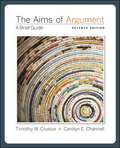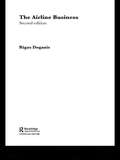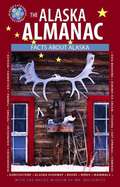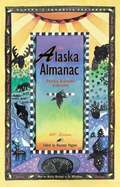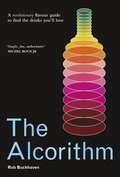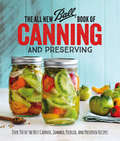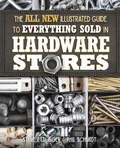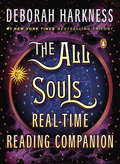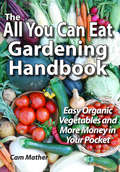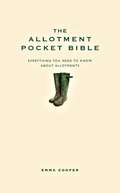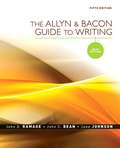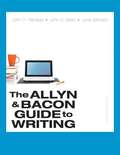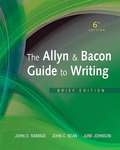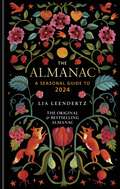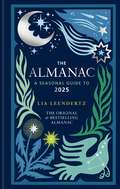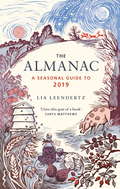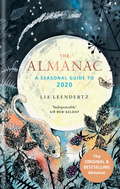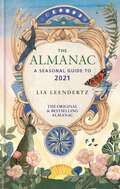- Table View
- List View
The Aimee Leduc Companion: A Guide to Cara Black's Paris
by Cara Black Phil GaskillThis is the perfect guide to Paris for armchair travelers and the ultimate companion to Cara Black's bestselling Aimée Leduc series. For newcomers and old fans alike, this companion will bring you up to speed on previous books in the series. Tour the arrondissements of Paris with interactive maps that show not only places featured in the twelve books of the series, but Cara's favorite cafes, bistros, and shops in Paris, and various other nooks and crannies of the City of Lights.
The Aims of Argument: A Brief Guide
by Timothy W. Crusius Carolyn E. ChannellThe Aims of Argument, a comprehensive text for teaching argument, recognizes that people argue with a range of purposes in mind: to inquire, to convince, to persuade, and to negotiate. It offers a clear, logical learning sequence rather than merely a collection of assignments: inquiry is the search for truth, what we call an earned opinion, which then becomes the basis of efforts to convince others to accept our earned opinions. Case-making, the essence of convincing, is then carried over into learning how to persuade, which, requires explicit attention to appeals to character, emotion, and style. Finally, the previous three aims all play roles in negotiation, which amounts to finding and defending positions capable of appealing to all sides in a dispute or controversy.
The Airline Business
by Rigas DoganisThe airline industry is currently faced with its longest and deepest crisis to date: many airlines are losing hundred of millions of US dollars, several have collapsed entirely and others have been rescued by their governments. This crisis has been precipitated by external shocks such as the attack on the Twin Towers in New York, the invasion of Iraq and the SARS epidemic. In addition, the effect of these events has been exacerbated by dynamic and potentially destabilizing internal developments. Comprehensive and thorough, this revealing book gives a detailed analysis of the crucial events and key developments which have impacted, and will continue to impact on the dynamics of the airline industry. Special attention is paid to: the key challenges faced by the airlines such as continued liberalization and ‘open skies’ the impacts of global alliances new low-cost and no-frills carriers on-line selling and distribution privatization the impact of disasters. Leading industry authority Rigas Doganis examines the future prospects for the changing airline business and assesses alternative policies which could help the sector adapt to the shifting marketplace. Ideal for students, researchers and professionals in the fields of economics and business, industry and transportation studies, this second edition of his definitive book brings the story right up to date.
The Airline Business
by Rigas DoganisThe airline industry is currently faced with its longest and deepest crisis to date: many airlines are losing hundred of millions of US dollars, several have collapsed entirely and others have been rescued by their governments. This crisis has been precipitated by external shocks such as the attack on the Twin Towers in New York, the invasion of Iraq and the SARS epidemic. In addition, the effect of these events has been exacerbated by dynamic and potentially destabilizing internal developments. Comprehensive and thorough, this revealing book gives a detailed analysis of the crucial events and key developments which have impacted, and will continue to impact on the dynamics of the airline industry. Special attention is paid to: the key challenges faced by the airlines such as continued liberalization and ‘open skies’ the impacts of global alliances new low-cost and no-frills carriers on-line selling and distribution privatization the impact of disasters. Leading industry authority Rigas Doganis examines the future prospects for the changing airline business and assesses alternative policies which could help the sector adapt to the shifting marketplace. Ideal for students, researchers and professionals in the fields of economics and business, industry and transportation studies, this second edition of his definitive book brings the story right up to date.
The Alaska Almanac: Facts about Alaska
by Nancy Gates WhitekeysThe Alaska Almanac is an indispensable reference for those who are traveling to the north or those who already know and love it but want to impress others with their encyclopedic knowledge of Alaska's fascinating past and present. Updated each year, this affordable, best-selling guide offers accurate, timely facts on geography, history, economy, employment, recreation, trophy records, climate, and people of the state with the most ever largest lake, tallest mountain, longest coastline, biggest cabbage, most acreage in national parks and more. It also features Alaska's funniest man, Mr. Whitekeys, who manages to find some of the more bizarre facts about the state for us.
The Alaska Almanac: Facts about Alaska (24th edition)
by Rosanne PaganoAlaskans rank No. 1 in the nation in attainment of high-school degrees, No. 1 in ownership of Harley Davidson motorcycles, No. 1 in consumption of ice cream, and Alaskans are the second-highest per capita consumers of SPAM in the nation. To top it off, the makers of Itch-X anti-itch gel, named Wasilla "The 17th Itchiest City in the United States." Life has been good to Alaska for another year.
The Alcorithm: A revolutionary flavour guide to find the drinks you’ll love
by Rob BuckhavenDiscover your new favourite wines, beers, spirits and cocktails in this unique and ingenious guide, led by your own taste buds'All about the pleasures of raising a glass. This book tells you what to try next and why . . . Cheers!' Michel Roux Jr'A kind of Flavour Thesaurus but for drinks. A joyful, thoughtful labyrinth in which you can happily lose yourself for hours' Daily Telegraph'From floral to fruity, smoky to spicy, this invaluable tome will tell you how to hit every flavour high note' Esquire's 'Best Cocktail Books of 2023'**Finalist in the Guild of Food Writers Award for Drinks Book of the Year**________Do you always ask for the same old wine, the usual pint, the reliable spirit? It's all too easy to play it safe, and finding new favourites can take time and effort.Until now.Using the algorithm 'If you like this, you'll love that', this ingenious guide will lead you by your taste buds, using your existing favourite drinks and flavours to reveal vast varieties that will also suit your palate.Fan of New Zealand Sauvignon Blanc? Try Sancerre for similar grassy notes.Partial to Vintage Champagne? Believe it or not, you may also like a Brown Porter.Those who enjoy Scotch Single Malt Whisky should give a Californian Pinot Noir a go, while a preference for Pornstar Martinis suggests you'll also be fond of Japanese Sake.Exploring the gamut of flavour styles, from floral and fruity to smoky and spicy, then showcasing all the drinks in which you can find them, from wine, beer, cider, tequila and vodka through to tea, coffee, mixers and everything in betweenThere's a whole universe of incredible wine, beer, spirits and cocktails just waiting to be discovered and enjoyed - if only we can step outside that comfort zone.This book will show you how.________'Rob Buckhaven will help you discover your new favourite tipple . . . He knows his stuff and his enthusiasm is infectious' Sunday Express
The All New Ball Book Of Canning And Preserving: Over 200 of the Best Canned, Jammed, Pickled, and Preserved Recipes
by Jarden Home BrandsFrom the experts at Jarden Home Brands, makers of Ball canning products, comes the first truly comprehensive canning guide created for today's home cooks. This modern handbook boasts more than 350 of the best recipes ranging from jams and jellies to jerkies, pickles, salsas, and more-including extender recipes to create brand new dishes using your freshly preserved farmer's market finds or vegetable garden bounty.Organized by technique, The All New Ball Book of Canning and Preserving covers water bath and pressure canning, pickling, fermenting, freezing, dehydrating, and smoking. Straightforward instructions and step-by-step photos ensure success for beginners, while practiced home canners will find more advanced methods and inspiring ingredient twists. Thoroughly tested for safety and quality by thermal process engineers at the Fresh Preserving Quality Assurance Lab, recipes range from much-loved classics - Tart Lemon Jelly, Tomato-Herb Jam, Ploughman's Pickles - to fresh flavors such as Asian Pear Kimchi, Smoked Maple-Juniper Bacon, and homemade Kombucha. Make the most of your preserves with delicious dishes including Crab Cakes garnished with Eastern Shore Corn Relish and traditional Strawberry-Rhubarb Hand Pies. Special sidebars highlight seasonal fruits and vegetables, while handy charts cover processing times, temperatures, and recipe formulas for fast preparation.Lushly illustrated with color photographs, The All New Ball Book of Canning and Preserving is a classic in the making for a new generation of home cooks.
The All New Illustrated Guide to Everything Sold in Hardware Stores
by Steve Ettlinger Phil SchmidtAn updated edition of the ultimate hardware shopping guide and reference book: “Organized, accessible and cheerfully reassuring.” —Publishers WeeklyTired of making multiple trips to the hardware store because you purchased the wrong item? Or wandering the aisles feeling overwhelmed and bewildered? This is the illustrated reference that helps you learn the difference between drywall screws and deck screws; between faucet washers and neoprene O-rings; and between red wire nuts and blue wire nuts. And that’s before we even get to understanding nail gauges and drill bit sizes. The next time you talk to a hardware store clerk, rather than asking for “screws about two inches long,” you’ll be able to ask for #3 gauge 2-1/4-inch-long panhead screws with SAE 5/16’ flat washers!The All New Illustrated Guide to Everything Sold in Hardware Stores is filled with color photos that let you see in life-size scale what different screws and nails and washers and bolts are called, accompanied by brief descriptions of their recommended uses—so you’ll be able to ask for them with accuracy and use them with precision.“Recommended for beginners: new homeowners and handypersons just getting started.” —Library Journal
The All Souls Real-Time Reading Companion
by Deborah HarknessA richly illustrated real-time reading guide that brings to life the world created by Deborah Harkness in A Discovery of Witches and Shadow of Night, retracing the events of the bestselling novels with illuminating behind-the-scenes details
The All You Can Eat Gardening Handbook
by Cam MatherThere's never been a better time to grow your own food as we face the converging challenges of the financial crisis, climate change, water shortages, peak oil, and 6.5 billion people worldwide competing for a limited amount of food.Many gardening books are so technical that they are intimidating to the beginning gardener. This book shows how easy gardening can be while providing tips and techniques to ensure success. Whether you live in the country, the city, or the suburbs, you'll learn:How to create lots of rich compost as the basis for vigorous growth Simple techniques to safely deal with pests The most effective techniques for irrigation, including harvesting your rainwater How to store your harvest using canning, freezing, and drying techniques How to build and stock a root cellar How to choose which vegetables to grow based on their nutritional valueThis book is a step-by-step guide to turning your lawn into a great source of personal satisfaction and economic independence. Having an organic produce department in your backyard creates your own "one hundred-foot diet" to reduce your carbon footprint and keep more money in your pocket.Cam Mather has been gardening organically and market gardening for thirty-five years. His entertaining and informative workshops and DVD have inspired thousands of people to get out and get their hands dirty. He publishes books about renewable energy and sustainability from his off-grid solar and wind-powered home office.
The Allotment Pocket Bible
by Emma CooperFancy having a go at growing your own produce?How do you improve your chances of getting an allotment? How do you plan what to grow? And what exactly is a cold frame? Find the answer to all these questions and more inside The Allotment Pocket Bible, the perfect gardening gift full of indispensible tips on how to grow your own herbs and veg all year round on an allotment. Full of practical advice on cultivating and enjoying your plot - whether you've got an allotment in the city, a patch in your garden or an area of farmland, The Allotment Pocket Bible gives gardeners tips from how to find and get different types of allotment to how to organise and manage your allotment space. There s also valuable advice on what to grow (as well as a growing calendar to help you decide when to grow it), tips on edible flowers and fighting pests and diseases. As well as learning the many benefits of allotment gardening, you can also pick up time-saving tips and techniques from pruning to storing your produce.From greenhouses to polytunnels, all the essential information you need to know about allotment gardening can be found in this handy, easy-to-read and durable guide, helping you grow your own produce all year round.Inside The Allotment Pocket Bible you can discover the rising popularity of allotment gardening, as well as how to turn your allotment into a productive venture. Dip in to great ideas for fruit, vegetable and herb recipes made from your hard-earned produce, learn how you can get kids involved with your allotment projects and make sure you've got all the right tools and equipment to make looking after your allotment as easy as possible.From clearing your new allotment and planting raised beds to building compost bins and when to sow, plant and harvest your crops, you ll find all the handy, easy-to-follow advice you need in The Allotment Pocket Bible. Want to start gardening organically and grow your own organic food? The Allotment Pocket Bible will help you grow your own organic produce: organic vegetables, organic fruit and organic herbs.Wondering how to make money from your allotment produce? Planning an allotment competition? Find tips on all the rules and regulations you need to know, as well as how to engage with the allotment community and maintain relations with allotment neighbours..Small and durable and perfectly designed to be used on the job , The Allotment Pocket Bible is sure to be your trusty companion on your next visit to the potting shed."An hour's hard digging is a good way of getting one's mind back in the right perspective."Richard Briers "Cultivate the garden for the nose, and the eyes will take care of themselves."Robert Louis Stevenson"All my hurts my garden spade can heal"Ralph Waldo Emerson"The man who has planted a garden feels that he has done something for the good of the world."Vita Sackville-West "Gardening is the purest of human pleasures"Francis BaconThis beautiful hardback edition has both dust-cover and gold embossing on the spine making it the perfect gift. Every Pocket Bible is lovingly crafted to give you a unique mix of useful references, handy tips and fascinating trivia that will enlighten and entertain you at every page. There is a Pocket Bible for everyone...Other titles in the series: The Allotment Pocket Bible, The Baking Pocket Bible, The Cook's Pocket Bible, The Mum's Pocket Bible and The Outdoor Pocket Bible.
The Allotment Pocket Bible
by Emma CooperFancy having a go at growing your own produce?How do you improve your chances of getting an allotment? How do you plan what to grow? And what exactly is a cold frame? Find the answer to all these questions and more inside The Allotment Pocket Bible, the perfect gardening gift full of indispensible tips on how to grow your own herbs and veg all year round on an allotment. Full of practical advice on cultivating and enjoying your plot - whether you've got an allotment in the city, a patch in your garden or an area of farmland, The Allotment Pocket Bible gives gardeners tips from how to find and get different types of allotment to how to organise and manage your allotment space. There s also valuable advice on what to grow (as well as a growing calendar to help you decide when to grow it), tips on edible flowers and fighting pests and diseases. As well as learning the many benefits of allotment gardening, you can also pick up time-saving tips and techniques from pruning to storing your produce.From greenhouses to polytunnels, all the essential information you need to know about allotment gardening can be found in this handy, easy-to-read and durable guide, helping you grow your own produce all year round.Inside The Allotment Pocket Bible you can discover the rising popularity of allotment gardening, as well as how to turn your allotment into a productive venture. Dip in to great ideas for fruit, vegetable and herb recipes made from your hard-earned produce, learn how you can get kids involved with your allotment projects and make sure you've got all the right tools and equipment to make looking after your allotment as easy as possible.From clearing your new allotment and planting raised beds to building compost bins and when to sow, plant and harvest your crops, you ll find all the handy, easy-to-follow advice you need in The Allotment Pocket Bible. Want to start gardening organically and grow your own organic food? The Allotment Pocket Bible will help you grow your own organic produce: organic vegetables, organic fruit and organic herbs.Wondering how to make money from your allotment produce? Planning an allotment competition? Find tips on all the rules and regulations you need to know, as well as how to engage with the allotment community and maintain relations with allotment neighbours..Small and durable and perfectly designed to be used on the job , The Allotment Pocket Bible is sure to be your trusty companion on your next visit to the potting shed."An hour's hard digging is a good way of getting one's mind back in the right perspective."Richard Briers "Cultivate the garden for the nose, and the eyes will take care of themselves."Robert Louis Stevenson"All my hurts my garden spade can heal"Ralph Waldo Emerson"The man who has planted a garden feels that he has done something for the good of the world."Vita Sackville-West "Gardening is the purest of human pleasures"Francis BaconThis beautiful hardback edition has both dust-cover and gold embossing on the spine making it the perfect gift. Every Pocket Bible is lovingly crafted to give you a unique mix of useful references, handy tips and fascinating trivia that will enlighten and entertain you at every page. There is a Pocket Bible for everyone...Other titles in the series: The Allotment Pocket Bible, The Baking Pocket Bible, The Cook's Pocket Bible, The Mum's Pocket Bible and The Outdoor Pocket Bible.
The Allyn & Bacon Guide to Writing: Brief Edition (5th edition)
by John D. Ramage John C. Bean June JohnsonSolidly grounded in current theory and research, yet eminently practical and teachable, The Allyn & Bacon Guide to Writing has set the standard for first-year composition courses in writing, reading, critical thinking, and inquiry.
The Allyn And Bacon Guide To Writing (Seventh Edition)
by John D. Ramage John C. Bean June JohnsonGrounded in current theory and research, yet practical and teachable. Widely praised for its groundbreaking integration of composition research and a rhetorical perspective, The Allyn & Bacon Guide to Writing with MyWritingLab has set the standard for first-year composition courses in writing, reading, critical thinking, and inquiry. Teachers and students value its clear and coherent explanations, engaging classroom activities, and flexible sequence of aims-based writing assignments that help writers produce effective, idea-rich essays in academic and civic genres. Numerous examples of student and professional writing accompany this thorough guide to the concepts and skills needed for writing, researching, and editing in college and beyond.
The Allyn and Bacon Guide to Writing (Brief 6th Edition)
by John D. Ramage John C. Bean June C. JohnsonSolidly grounded in current theory and research, yet eminently practical and teachable, The Allyn & Bacon Guide to Writing has set the standard for first-year composition courses in writing, reading, critical thinking, and inquiry.
The Almanac: A Seasonal Guide To 2018 (Almanac)
by Lia LeendertzTHE ORIGINAL & BESTSELLING ALMANACReconnect with the seasons in Britain and Ireland with this month-by-month guide to the world around us - including tide tables, sunrises and moon phases; garden feasts, wildlife and folklore; seasonal recipes, snacks and more.The Almanac: A Seasonal Guide to 2024 gives you the tools and inspiration you need to celebrate, mark and appreciate each month of the year in your own particular way.Divided into the 12 months, a set of tables each month gives it the feel and weight of a traditional almanac, providing practical information that gives access to the outdoors and the seasons, perfect for expeditions, meteor-spotting nights and beach holidays. This year's edition focuses on the natural wonders of the garden, celebrating the beautiful flora and fauna at your doorstep. There are also features on each month's unique nature, plus a flower and a snack of the month.You will find yourself referring to The Almanac all year long, revisiting it again and again, and looking forward to the next edition as the year draws to a close.PRAISE FOR THE ALMANAC:'Lia Leendertz's classic almanac never fails to delight' - The Herald'It's a perfect Christmas present' - Allan Jenkins, The Observer'The perfect companion to the seasons' - India Knight'Indispensable' - Sir Bob Geldof'This book is your bible' - The Independent'I love this gem of a book' - Cerys Matthews
The Almanac: A Seasonal Guide To 2018 (Almanac)
by Lia LeendertzTHE ORIGINAL & BESTSELLING ALMANACReconnect with the seasons in Britain and Ireland with this month-by-month guide to the world around us - including tide tables, sunrises and moon phases; garden feasts, wildlife and folklore; seasonal recipes, snacks and more.The Almanac: A Seasonal Guide to 2024 gives you the tools and inspiration you need to celebrate, mark and appreciate each month of the year in your own particular way.Divided into the 12 months, a set of tables each month gives it the feel and weight of a traditional almanac, providing practical information that gives access to the outdoors and the seasons, perfect for expeditions, meteor-spotting nights and beach holidays. This year's edition focuses on the natural wonders of the garden, celebrating the beautiful flora and fauna at your doorstep. There are also features on each month's unique nature, plus a flower and a snack of the month.You will find yourself referring to The Almanac all year long, revisiting it again and again, and looking forward to the next edition as the year draws to a close.PRAISE FOR THE ALMANAC:'Lia Leendertz's classic almanac never fails to delight' - The Herald'It's a perfect Christmas present' - Allan Jenkins, The Observer'The perfect companion to the seasons' - India Knight'Indispensable' - Sir Bob Geldof'This book is your bible' - The Independent'I love this gem of a book' - Cerys Matthews
The Almanac: A Seasonal Guide To 2018 (Almanac)
by Lia LeendertzThe original and bestselling almanacReconnect with the seasons in Britain and Ireland with this month-by-month guide to the world around us - including tide tables, sunrises and moon phases; wildlife and folklore; seasonal recipes and more.The Almanac: A Seasonal Guide to 2025 gives you the tools and inspiration you need to celebrate, mark and appreciate each month of the year in your own particular way.Divided into the 12 months, a set of tables each month gives it the feel and weight of a traditional almanac, providing practical information that gives access to the outdoors and the seasons, perfect for expeditions, meteor-spotting nights and beach holidays. And it's the ideal gift!You will find yourself referring to The Almanac all year long, revisiting it again and again, and looking forward to the next edition as the year draws to a close.PRAISE FOR THE ALMANAC:'Lia Leendertz's classic almanac never fails to delight' - The Herald'It's a perfect Christmas present' - Allan Jenkins, The Observer'The perfect companion to the seasons' - India Knight'Indispensable' - Sir Bob Geldof'This book is your bible' - The Independent'I love this gem of a book' - Cerys Matthews
The Almanac: A Seasonal Guide To 2018 (Almanac)
by Lia LeendertzThe original and bestselling almanacReconnect with the seasons in Britain and Ireland with this month-by-month guide to the world around us - including tide tables, sunrises and moon phases; wildlife and folklore; seasonal recipes and more.The Almanac: A Seasonal Guide to 2025 gives you the tools and inspiration you need to celebrate, mark and appreciate each month of the year in your own particular way.Divided into the 12 months, a set of tables each month gives it the feel and weight of a traditional almanac, providing practical information that gives access to the outdoors and the seasons, perfect for expeditions, meteor-spotting nights and beach holidays. And it's the ideal gift!You will find yourself referring to The Almanac all year long, revisiting it again and again, and looking forward to the next edition as the year draws to a close.PRAISE FOR THE ALMANAC:'Lia Leendertz's classic almanac never fails to delight' - The Herald'It's a perfect Christmas present' - Allan Jenkins, The Observer'The perfect companion to the seasons' - India Knight'Indispensable' - Sir Bob Geldof'This book is your bible' - The Independent'I love this gem of a book' - Cerys Matthews
The Almanac: A Seasonal Guide to 2019
by Lia LeendertzTHE ORIGINAL & BESTSELLING ALMANAC 'I love this gem of a book' - Cerys Matthews 'This book is your bible' - The Independent '...it already feels like an annual necessity' - India Knight'Joyous' - Allan Jenkins'Updated for 2019 with more lovely ideas to celebrate the seasons' - Gardens Illustrated'A charming book. This is a real gem of a gift' - Sunday Express, S Magazine. A perfect toolkit connecting with the world around us and the year ahead as it unfolds - all in a compact and pocket size that just begs you to pick it up and browse - Reckless Gardener or Its range of information and depth of understanding of our seasons is priceless - Reckless GardenerThe Almanac: A Seasonal Guide to 2019 reinvents the tradition of the rural almanac for a new audience. It gives you the tools and inspiration you need to celebrate, mark and appreciate each month of the year in your own particular way. Divided into the 12 months, a set of tables each month gives it the feel and weight of a traditional almanac, providing practical information that gives access to the outdoors and the seasons, perfect for expeditions, meteor-spotting nights and beach holidays. There are also features on each month's unique nature, such as the meteor shower of the month, beehive behaviour, folklore and stories, seasonal recipes and charts tracking moon phases and tides. Why not try identifying trees by their bare buds in January; Enjoy Buttermilk scones with orangle blossom & honey butter in June; Discover the Chinese New Year story of 'The great race' in February.You will find yourself referring to the almanac all year long, revisiting it again and again, and looking forward to the next edition as the year draws to a close.Praise for The Almanac: A Seasonal Guide to 2018:'The perfect companion to the seasons' - India Knight'A richly layered book of events, celebrations and everyday information that together create a beautiful, fascinating resource . . . In the single month I've had my hands on it, the book has quietly "worked".' - Telegraph'Beautifully written, this pocket-sized guide is a labour of love and will remind you to appreciate little moments throughout the year.' - Gardens Illustrated'Elegant . . . an ideal stocking filler.' - The English Garden
The Almanac: A Seasonal Guide to 2019
by Lia LeendertzTHE ORIGINAL & BESTSELLING ALMANAC 'I love this gem of a book' - Cerys Matthews 'This book is your bible' - The Independent '...it already feels like an annual necessity' - India Knight'Joyous' - Allan Jenkins'Updated for 2019 with more lovely ideas to celebrate the seasons' - Gardens Illustrated'A charming book. This is a real gem of a gift' - Sunday Express, S Magazine. A perfect toolkit connecting with the world around us and the year ahead as it unfolds - all in a compact and pocket size that just begs you to pick it up and browse - Reckless Gardener or Its range of information and depth of understanding of our seasons is priceless - Reckless GardenerThe Almanac: A Seasonal Guide to 2019 reinvents the tradition of the rural almanac for a new audience. It gives you the tools and inspiration you need to celebrate, mark and appreciate each month of the year in your own particular way. Divided into the 12 months, a set of tables each month gives it the feel and weight of a traditional almanac, providing practical information that gives access to the outdoors and the seasons, perfect for expeditions, meteor-spotting nights and beach holidays. There are also features on each month's unique nature, such as the meteor shower of the month, beehive behaviour, folklore and stories, seasonal recipes and charts tracking moon phases and tides. Why not try identifying trees by their bare buds in January; Enjoy Buttermilk scones with orangle blossom & honey butter in June; Discover the Chinese New Year story of 'The great race' in February.You will find yourself referring to the almanac all year long, revisiting it again and again, and looking forward to the next edition as the year draws to a close.Praise for The Almanac: A Seasonal Guide to 2018:'The perfect companion to the seasons' - India Knight'A richly layered book of events, celebrations and everyday information that together create a beautiful, fascinating resource . . . In the single month I've had my hands on it, the book has quietly "worked".' - Telegraph'Beautifully written, this pocket-sized guide is a labour of love and will remind you to appreciate little moments throughout the year.' - Gardens Illustrated'Elegant . . . an ideal stocking filler.' - The English Garden
The Almanac: A Seasonal Guide to 2020
by Lia Leendertz*THE ORIGINAL & BESTSELLING ALMANAC *'Indispensable' - Sir Bob Geldof A perfect toolkit connecting with the world around us and the year ahead as it unfolds - all in a compact and pocket size that just begs you to pick it up and browse.The Almanac: A Seasonal Guide to 2020 reinvents the tradition of the rural almanac for a new audience. It gives you the tools and inspiration you need to celebrate, mark and appreciate each month of the year in your own particular way. Divided into the 12 months, a set of tables each month gives it the feel and weight of a traditional almanac, providing practical information that gives access to the outdoors and the seasons, perfect for expeditions, meteor-spotting nights and beach holidays. There are also features on each month's unique nature, such as the meteor shower of the month, beehive behaviour, folklore and stories, seasonal recipes and charts tracking moon phases and tides. You will find yourself referring to the almanac all year long, revisiting it again and again, and looking forward to the next edition as the year draws to a close. PRAISE FOR THE ALMANAC: A SEASONAL GUIDE:'The perfect companion to the seasons' - India Knight'This book is your bible' - the Independent 'An ideal stocking filler' - The English Garden 'I love this gem of a book' - Cerys Matthews
The Almanac: A Seasonal Guide to 2020
by Lia Leendertz*THE ORIGINAL & BESTSELLING ALMANAC *'Indispensable' - Sir Bob Geldof A perfect toolkit connecting with the world around us and the year ahead as it unfolds - all in a compact and pocket size that just begs you to pick it up and browse.The Almanac: A Seasonal Guide to 2020 reinvents the tradition of the rural almanac for a new audience. It gives you the tools and inspiration you need to celebrate, mark and appreciate each month of the year in your own particular way. Divided into the 12 months, a set of tables each month gives it the feel and weight of a traditional almanac, providing practical information that gives access to the outdoors and the seasons, perfect for expeditions, meteor-spotting nights and beach holidays. There are also features on each month's unique nature, such as the meteor shower of the month, beehive behaviour, folklore and stories, seasonal recipes and charts tracking moon phases and tides. You will find yourself referring to the almanac all year long, revisiting it again and again, and looking forward to the next edition as the year draws to a close. PRAISE FOR THE ALMANAC: A SEASONAL GUIDE:'The perfect companion to the seasons' - India Knight'This book is your bible' - the Independent 'An ideal stocking filler' - The English Garden 'I love this gem of a book' - Cerys Matthews
The Almanac: A Seasonal Guide to 2021
by Lia Leendertz'The perfect companion to the seasons' - India KnightWelcome to The Almanac: A Seasonal Guide to 2021. If you are new to The Almanac then welcome; if you are a regular reader then hello! The Almanac is about celebrating the unfolding year in all its various facets. The old dependables which I include every year are back: moon phases, sun rises and sets, tide time tables and the sky at night. As ever there are seasonal recipes and monthly gardening tips for the flower and vegetable garden too, as well as a bit of folklore, and nature and a song for each month.This year's edition has a theme: movement, migration and pilgrimage. This was not a reaction to the unsettling events of last year - it was half written by the time Covid-19 hit - but writing it from lockdown did give me a heightened appreciation of the way in which Britain and Ireland have always and continue to be places of movement, and are intimately connected to the rest of the world. You will find within this book migration tales for each month of this year, but I have also searched out seasonal tales of human movement, and included a pilgrimage for each month, some ancient, some current, all underlining the spiritual benefits of putting one foot in front of the other. Every month I have included a method of navigating using the stars, sun or moon, so you can find your way around in the dark (or just look out of your window and know where south is). And our monthly folk songs are all shanties this year, work songs with movement at their very heart, created to coordinate muscle power to drive sailing ships backwards and forwards across the Atlantic Ocean, and containing influences from the eastern seaboard of the US down to the Caribbean and beyond mixed with British and Irish folk traditions. These songs are stitched through with movement and travel, as is this Almanac.PRAISE FOR THE ALMANAC: A SEASONAL GUIDE'This book is your bible' - The Independent'An ideal stocking filler' - The English Garden'I love this gem of a book' - Cerys Matthews'Indispensable' - Sir Bob Geldof'An uplifting nature-inspired guide' - Country & Town House magazine

